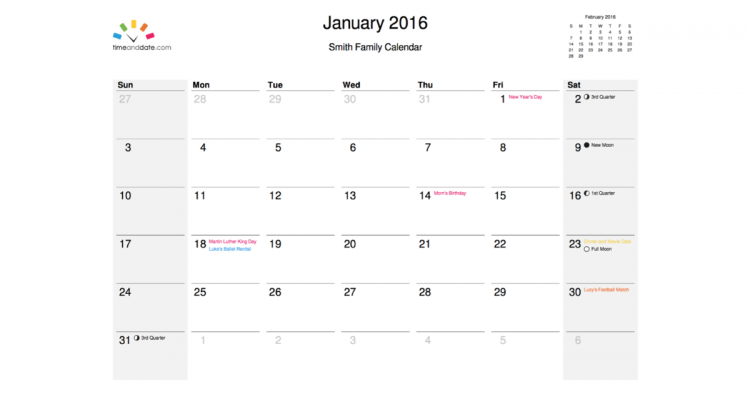Level: elementary
We use phrases with prepositions as time adverbials:
- We useatwith:
If you use the word 'or', instead of 'and' here, your problem will automatically be solved. There are two scenarios when the reader need to request for a date/time change: The reader may find the date does work him/her, then you need to change both the date and the time for him/her. (In this case, date and time can be viewed as one item, because they are bound together.
- Timeanddate.com, Stavanger, Norway. Www.timeanddate.com has been online providing 'The right time in the right place' since 1998! Accurate and reliable local times, time zone info, DST.
- Timeanddate.com, Stavanger, Norway. Www.timeanddate.com has been online providing 'The right time in the right place' since 1998! Accurate and reliable local times, time zone info, DST.
- This server provides free clocks you can use on your web site or blog. Please go to the configuration page to setup your own clock. Go to timeanddate.com.
| clock times: | at seven o'clock | at nine thirty | at fifteen hundred hours | |
| mealtimes: | at breakfast | at lunchtime | at teatime | |
| these phrases: | at night | at the weekend | at Christmas | at Easter |
- We useinwith:
| seasons of the year: | in (the) spring/summer/autumn/winter | ||||
| years, centuries, decades: | in 2009 | in 1998 | in the 20th century | in the 60s | in the 1980s |
| months: | in January/February/March etc. | ||||
| parts of the day: | in the morning | in the afternoon | in the evening |
- We use on with:
| days: | on Monday/Tuesday/Wednesday etc. | on Christmas day | on my birthday |
| dates: | on the thirty-first of July | on June the fifteenth |
| Be careful! |
|---|
We say at night when we are talking about all of the night:
but we say in the night when we are talking about a specific time during the night:
|
We often use a noun phrase as a time adverbial:
| yesterday | today | tomorrow |
| last week/month/year | this week/month/year | next week/month/year |
| last Saturday | this Tuesday | next Friday |
| the day before yesterday | the day after tomorrow | |
| one day/week/month | ||
| the other day/week/month |

We can put time phrases together:
We will meet next weekat six o'clockon Monday.
I heard a funny noise at about eleven o'clocklast night.
It happened last week at seven o'clock on Monday night.
We use ago with the past simple to say how long before the time of speaking something happened:
I saw Jim about three weeks ago.
We arrived a few minutes ago. https://just-soft.medium.com/ipulse-3-0-5-44a9262498ef. Poker machine wins.
We use in with a future form to say how long after the time of speaking something will happen:
Etrecheck pro 5 250. I'll see you in a month.
Our train's leaving in five minutes.
- When (time and dates)
- Log in or register to post comments
In today's C programming language tutorial we take a look at how to use time and date from C programs.
To make use of time and date function you need to include the time.h header file from the standard C library.
This header file contains functions and macros that provide standardized access to time and date. It also contains functions to manipulate and format the time and date output. The time.h reference page contains more information about the different time and date functions.
UNIX Time or POSIX Time
Time And Date Star Map
The function time() returns the type time_t. The time that is returned represents the number of seconds elapsed since 00:00 hours, Jan 1, 1970 UTC. It's also called UNIX EPOCH time.
Ios emulator linux. It is widely used not only on Unix-like operating systems but also in many other computing systems.
Fun note: On February 13, 2009 at exactly 23:31:30 (UTC), UNIX time was equal to ‘1234567890'.
Let's take a look at a source code example:
MS Windows and Time
Microsoft Windows is also different time for different things. Normally we only place programs that will compile on UNIX, Linux and Windows, but this time we make an exception and show you also a Windows example.
(Note: that the other programs in this tutorial should also work and compile on Windows.)
Windows has it's own SYSTEMTIME structure which stores information on the date and time. For instance: Year, Month, Day, Hour, Minutes, etc. The format of this structure looks as follows:
Take a look at the following example that uses GetSystemTime function to get the UTC time:
Note: the windows.h include, this program will not work on other platforms. Another thing we need to warn you about is that the program doesn't respond to daylight saving time issues.
Readable Current Local Time using ctime
The Unix EPOCH time is not readable for humans. To get a human-readable version of the current local time you can use the ctime() function. The function returns a C string containing the date and time information.
This string is followed by a new-line character (‘n') and it will convert the time_t object pointed by the timer to a C string containing a human-readable version of the corresponding local time and date.
Please note: that the functions ctime() and asctime() share the array which holds the time string.
If either one of these functions is called, the content of the array is overwritten.
An example of ctime() use:
The string that is returned will have the following format:
Manipulating the time structure with mktime()
It is also possible to manipulate the time structure and to create your own time using mktime().
Reeder 4 crack mac. Let's look at an example (note that the example will not change your system, it only prints a new time.):
Note: that you can set anything you want for the hour, min and sec as long as they don't cause a new day to occur.
As you can see we can also manipulate the time into the future. If you look at str_time.tm_hour and the output you will see that they don't correspond (10 and 11). This is because of the daylight saving time set on our computer. If you also have this then you should try the following: set the str_time.tm_mon to 0 to see the effect of daylight saving time. The result will be that the output now will be 10.
Using the function difftime
Date Time Calculator Add Subtract
The function difftime() is a very useful function, because it can be used to measure the performance time of a certain part of code. For instance in our example we measure the time of a loop (that is doing nothing at all.)
Take a look at the example:
Timezones
It is also possible to work with different timeszones by using gmtime() to convert calendar time to UTC.
If you know the UTC time you can add CET, for example Amsterdam +1 hour. Take a look at the following example:
Number of clock ticks
It is also possible to use clock ticks elapsed since the start of the program in your own programs by using the function clock(). For instance you can build a wait function or use it in your frame per second (FPS) function.
Take a look at the following wait example: 3d modelling and rendering.
World Time And Dates
In Conclusion
As you can see there are many ways to use time and dates in your programs. You never know when it time to use time functions in your programs, so learn them or at least play with them by making some example programs of your own. Also take a look at our C language calendar tutorial for a more advance use of the things explained in this tutorial.
